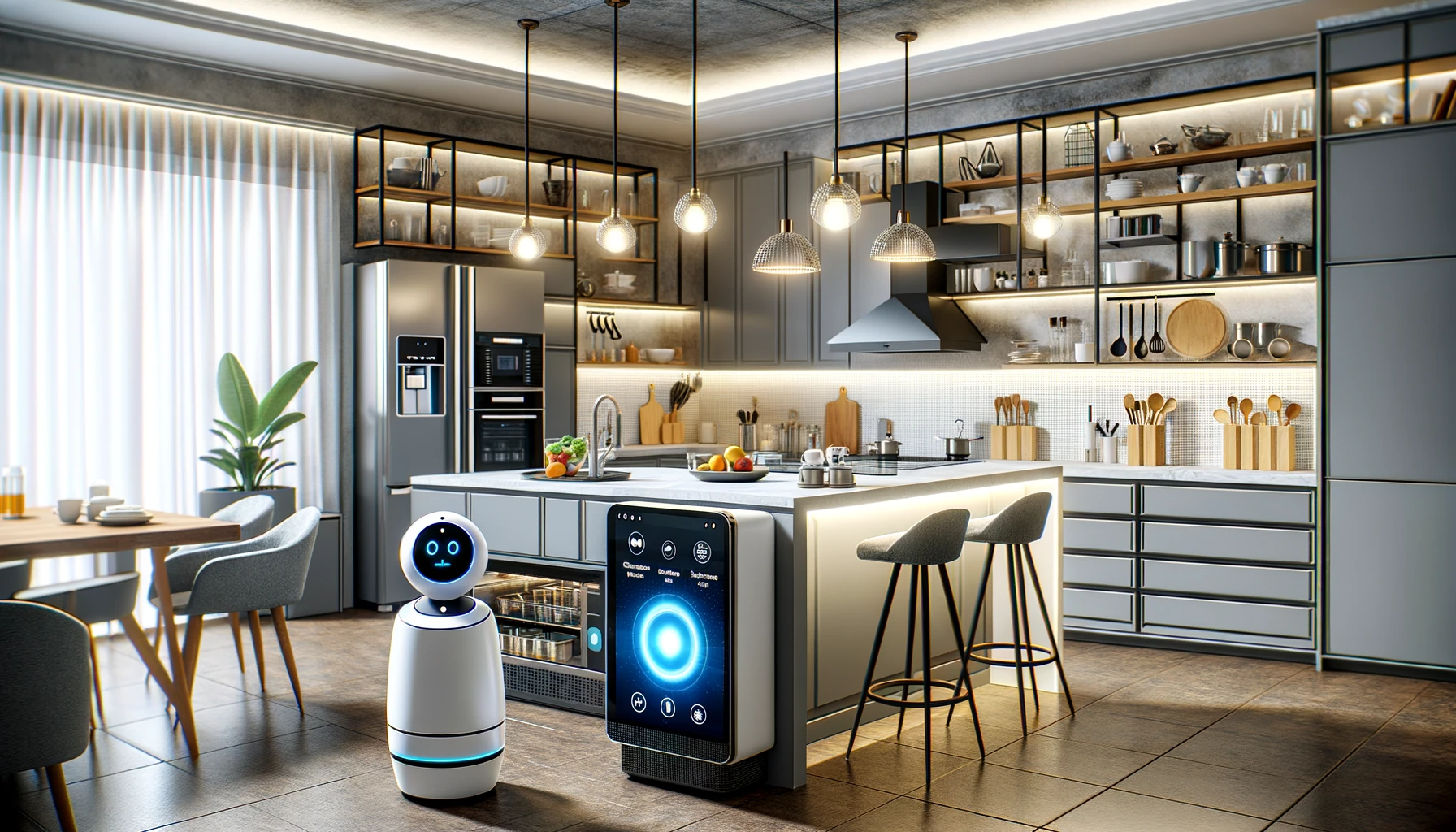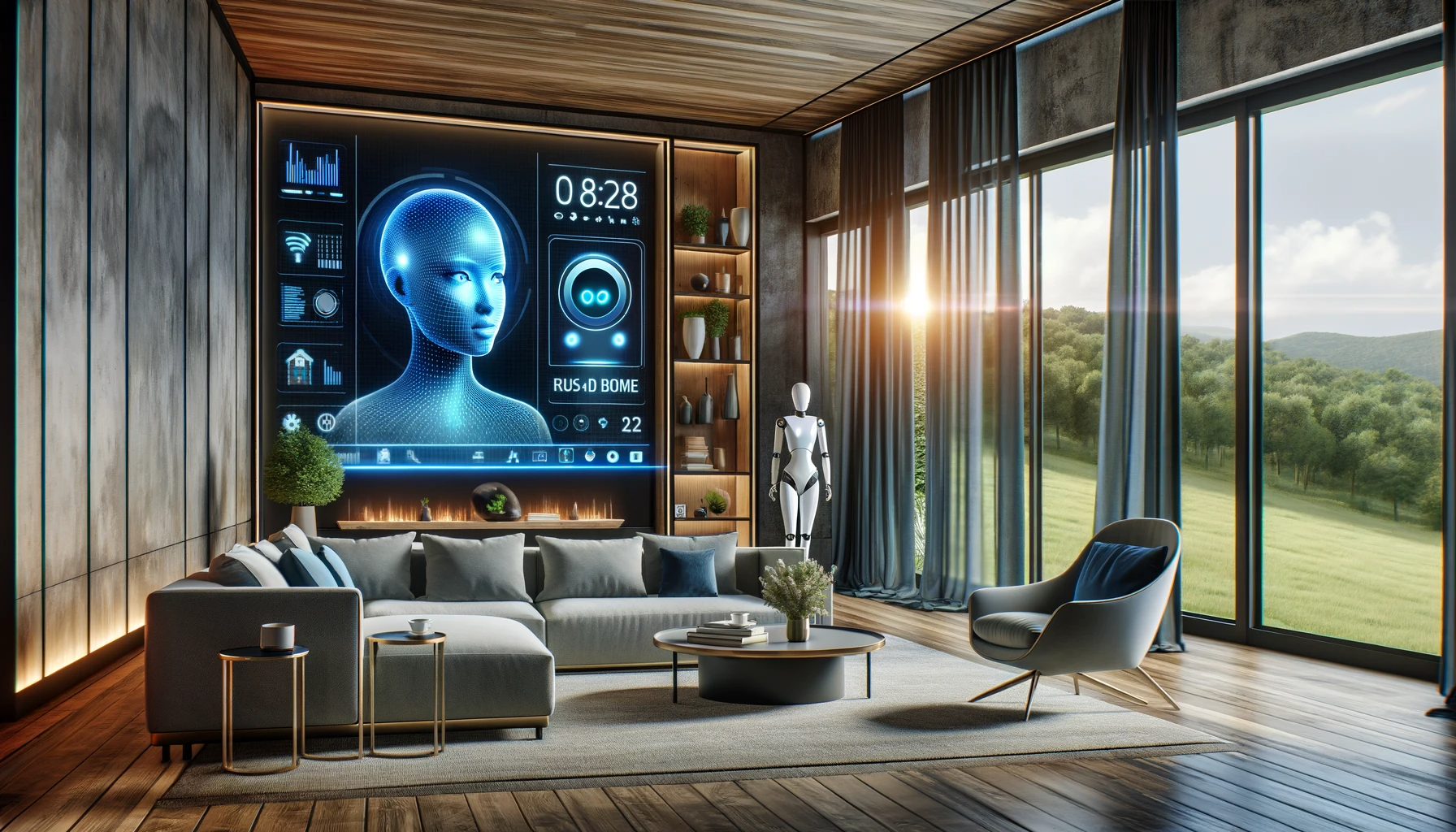The concept of a “smart home” has evolved from a futuristic idea into a tangible reality, transforming the way we live and interact with our living spaces. At the heart of this transformation lies Artificial Intelligence (AI), a groundbreaking technology that has rapidly woven itself into the fabric of our homes, enhancing convenience, security, and energy efficiency like never before. This article embarks on a journey to explore the remarkable synergy between AI and smart home technologies, unraveling how AI contributes to the evolution of our domestic environments.
In a world where the line between the physical and digital realms blurs, smart homes have emerged as a testament to human ingenuity. These homes are equipped with a myriad of interconnected devices and sensors that seamlessly interact with one another. However, it is the infusion of AI that truly empowers these devices, enabling them to learn, adapt, and make intelligent decisions based on user preferences and real-time data.
AI-powered home automation is the cornerstone of this revolution, reshaping how we interact with our living spaces. From adjusting the lighting to suit our moods to optimizing energy consumption for cost savings, AI-driven smart home devices have become trusted companions in our daily lives.
Beyond automation, AI plays a pivotal role in enhancing home security, bolstered by facial recognition, predictive analytics, and surveillance systems. Voice assistants like Amazon Alexa and Google Assistant, driven by AI and natural language processing, offer seamless communication between humans and machines, enriching the user experience.
Yet, with great innovation comes great responsibility. As we entrust our homes to AI, ethical considerations surrounding privacy, data security, and AI bias come to the forefront. This article navigates these challenges, shedding light on the responsible development and use of AI in smart homes.
Moreover, we glimpse into the future, where AI holds the promise of predictive maintenance, proactive health monitoring, and further enhancements in smart home technology. As we journey through the integration of AI in smart home devices, it becomes evident that our homes are not merely “smart” but also intuitive, responsive, and ultimately, an extension of our modern lives.

AI-Powered Home Automation
The first realm where AI contributes significantly to the evolution of smart homes is automation. Imagine a home that learns from your routines and adapts to your preferences without you having to lift a finger. This is the essence of AI-powered home automation.
In this AI-driven landscape, smart devices within your home, from lights to thermostats and entertainment systems, are no longer static components but dynamic entities that continuously gather data and make intelligent decisions. For instance, AI algorithms can analyze your daily routines, understand when you prefer a warmer ambiance, and adjust the thermostat accordingly. Similarly, they can recognize your usual bedtime and dim the lights and lower the blinds without you issuing a single command.
The power of AI lies in its ability to create a harmonious ecosystem within the smart home. Devices communicate with each other, sharing information and coordinating actions to optimize your comfort and convenience. For example, your AI-driven smart home can detect that you’ve left for work, adjust the thermostat to save energy, and ensure all lights and appliances are switched off, all without any manual intervention.
Energy Management and Efficiency
AI’s role in energy management is a cornerstone of the evolution of smart homes. Traditional homes often grapple with energy wastage due to inefficient heating, cooling, and lighting systems. AI steps in as a savior, transforming the way energy is managed and consumed within the home.
AI algorithms are adept at analyzing data from various sensors and devices, including temperature sensors, occupancy detectors, and weather forecasts. By processing this data, AI can make intelligent decisions to optimize energy consumption. For instance, it can determine the ideal temperature settings based on your schedule, the weather conditions, and energy cost fluctuations.
Additionally, AI plays a crucial role in grid integration and demand response. Smart homes equipped with AI can communicate with the energy grid, adjusting energy consumption during peak hours to alleviate strain on the grid and reduce electricity costs. This not only benefits homeowners by saving money but also contributes to a more efficient and sustainable energy ecosystem.
Enhanced Security and Privacy
Security is a paramount concern in any home, and AI takes home security to new heights. AI-driven smart home security systems are equipped with features that go beyond traditional locks and alarms, offering enhanced protection and peace of mind.
Facial recognition technology, powered by AI, allows smart home cameras to identify and verify individuals who approach your home. This means your home can recognize family members and authorized visitors while alerting you to potential intruders. Furthermore, AI can analyze movement patterns and detect anomalies, such as unexpected entry or unusual behavior, triggering immediate alerts and actions.
While AI brings enhanced security, it also raises questions about privacy and data security. The data collected by smart home devices, including video feeds and user preferences, must be securely managed to prevent unauthorized access. Ethical considerations regarding data privacy and consent are pivotal in ensuring that AI-enhanced smart homes protect both physical and digital boundaries.
These AI-powered advancements in home automation, energy management, and security underscore the transformative potential of AI in smart homes. They enhance not only the efficiency and convenience of our daily lives but also the overall quality and sustainability of our living spaces.
AI in Voice Assistants and User Experience
AI-driven voice assistants have become the friendly voices that guide us through our smart homes. These virtual companions, such as Amazon’s Alexa and Google Assistant, are more than mere gadgets—they are intelligent entities that understand and respond to our commands, transforming the user experience within our homes.
At the core of these voice assistants lies Natural Language Processing (NLP), a subset of AI that enables machines to comprehend and generate human language. Thanks to NLP, interacting with smart devices has never been more intuitive. You can issue voice commands for tasks as varied as adjusting the lighting, playing music, or answering trivia questions, and your AI-powered voice assistant responds seamlessly.
Voice assistants not only provide convenience but also enhance accessibility. They offer an inclusive way for individuals of all ages and abilities to interact with their smart homes. Voice commands eliminate the need for complex interfaces, making it easier for children and the elderly to control devices and access information.
Furthermore, voice assistants are constantly learning and evolving. They can adapt to your preferences and habits, making personalized recommendations and delivering a tailored user experience. As AI continues to advance, voice assistants are expected to become even more integral to our daily lives, assisting with tasks, offering information, and making our smart homes feel like responsive companions.

Challenges and Ethical Considerations
While the integration of AI in smart homes brings remarkable benefits, it is not without its challenges and ethical considerations. Interoperability, for instance, remains a hurdle as various devices and platforms often operate on different protocols. Ensuring seamless communication and compatibility among these devices requires standardized solutions.
Additionally, the ethical use of AI is a pressing concern. AI algorithms can inadvertently perpetuate biases present in training data, leading to discriminatory outcomes. Addressing AI bias and ensuring fairness in smart home technologies is essential to prevent discrimination based on factors such as gender, race, or age.
Data privacy and security are paramount in smart homes. AI relies on data, and the information collected by smart devices—ranging from video feeds to user behavior—must be safeguarded against breaches and unauthorized access. Smart home manufacturers and users alike must prioritize robust data protection measures.
Moreover, there is a need for responsible AI development and usage. Ensuring that AI algorithms prioritize user safety and well-being is crucial. As AI continues to evolve, it is imperative that developers and regulators work together to establish ethical guidelines and legal frameworks that protect consumers and ensure AI serves the greater good.
Future Trends and Conclusion
As we peer into the future, the synergy between AI and smart home technologies promises to usher in new possibilities and innovations. Predictive maintenance, for instance, will enable devices to anticipate and address issues before they become problems, prolonging the lifespan of appliances and reducing maintenance costs.
Proactive health monitoring is another frontier where AI can shine. Smart homes equipped with AI can continuously monitor occupants’ health indicators, providing early warnings for potential health issues and enabling prompt medical intervention. This not only enhances the quality of life but also supports aging in place.
In conclusion, the evolution of smart home technologies powered by AI is a testament to human ingenuity. These technologies have the potential to transform the way we live, making our homes more intuitive, efficient, and secure. Yet, with this transformative power comes a responsibility to navigate the ethical considerations and challenges that arise. By fostering responsible AI development and usage, we can harness the full potential of AI in our smart homes, enhancing our daily lives while safeguarding our privacy and security.
